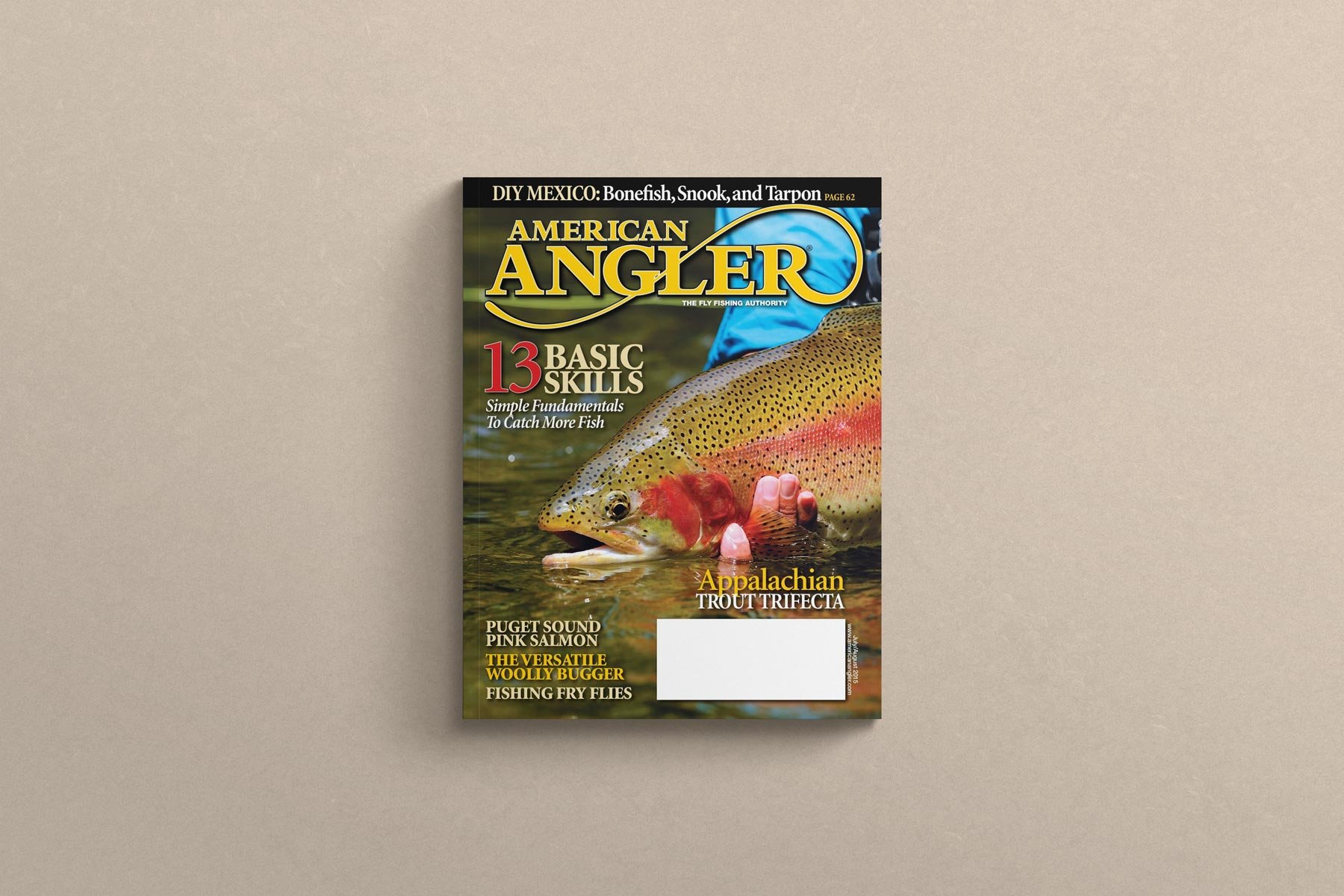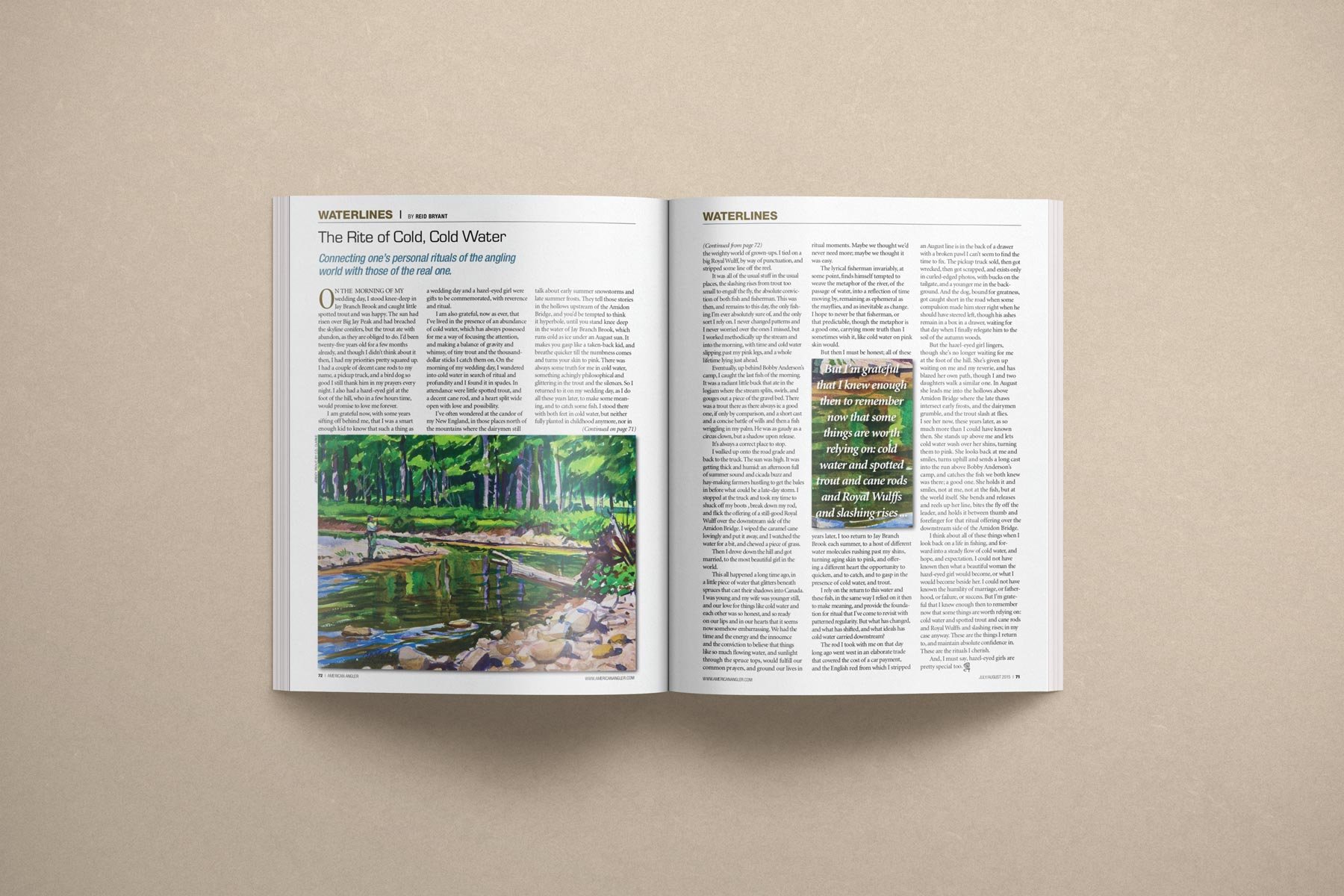The Rite of Cold, Cold Water
The morning of my wedding day, I stood knee-deep in the Jay Branch Brook and caught little spotted trout and was happy. The sun had risen over Big Jay Peak and had breached the skyline conifers, but the trout ate with abandon, as they are obliged to do. I’d been twenty-five years old for a few months already, and though I didn’t think about it then, I had my priorities pretty squared up. I had to my name a couple decent cane rods, a pickup truck, and a bird dog so good I still thank him in my prayers every night. I also had a hazel-eyed girl at the foot of the hill who, in a few hours time, would promise to love me forever.
I am grateful now, with some years sifting off behind me, that I was a smart enough kid to know that such a thing as a wedding day and a hazel-eyed girl were gifts to be commemorated, with reverence and ritual. I am also grateful, now as ever, that I’ve lived in the presence of an abundance of cold water, which has always possessed for me a way of focusing the attention, and making a balance of gravity and whimsy, of tiny trout and the thousand-dollar sticks I catch them on. On the morning of my wedding day, I wandered into cold water in search of ritual and profundity and I found it in spades. In attendance were little spotted trout, and a decent cane rod, and a heart split wide open with love and possibility.
I’ve often wondered at the candor of my New England, in those places north of the mountains where the dairymen still talk about early summer snowstorms and late summer frosts. They tell those stories in the hollows upstream of the Amidon Bridge, and you’d be tempted to think it hyperbole, until you stand knee deep in the water of the Jay Branch Brook, which runs cold as ice under an August sun. It makes you gasp like a taken-back kid, and breathe quicker till the numbness comes and turns your skin to pink. There was always some truth for me in cold water, something achingly philosophical and glittering in the trout and the silences. So I returned to it on my wedding day, as I do all these years later, to make some meaning, and to catch some fish. I stood there with both feet in cold water, but neither planted fully in childhood anymore, nor in the weighty world of grown-ups. I tied on a big Royall Wulff, by way of punctuation, and stripped some line off the reel.
It was all of the usual stuff in the usual places, the slashing rises from trout too small to engulf the fly, the absolute conviction of both fish and fisherman. This was then, and remains to this day, the only fishing I’m ever absolutely sure of, and the only sort I rely on. I never changed patterns and I never worried over the ones I missed, but I worked methodically up the stream and into the morning, with time and cold water slipping past my pink legs, and a whole lifetime lying just ahead. Eventually, up behind Bobby Anderson’s camp, I caught the last fish of the morning. It was a radiant little buck that ate in the logjam where the stream splits, and swirls, and gouges out a piece of the gravel bed. There was a trout there as there always is: a good one, if only by comparison, and a short cast and a concise battle of wills and then a fish wriggling in my palm. He was as gaudy as a circus clown, but a shadow upon release.
It’s always a correct place to stop.
I walked up onto the road grade and back to the truck. The sun was high. It was getting thick and humid: an afternoon full of summer sound and cicada buzz and hay-making farmers hustling to get the bales in before what could be a late-day storm. I stopped at the truck and took my time to shuck off my boots and take down my rod, and flick the offering of a still-good Royal Wulff over the downstream side of the Amidon Bridge. I wiped the caramel cane lovingly and put it away, and I watched the water for a bit, and chewed a piece of grass. Then I drove down the hill and got married, to the most beautiful girl in the world.
This all happened a long time ago, in a little piece of water that glitters beneath spruces that cast their shadows into Canada. I was young and my wife was younger still, and our love for things like cold water and each other was so honest, and so ready on our lips and in our hearts that it seems now somehow embarrassing. We had the time and the energy and the innocence and the conviction to believe that things like so much flowing water, and sunlight through the spruce tops, would fulfill our Common Prayers, and ground our lives in ritual moments. Maybe we thought we’d never need more; maybe we thought it was easy.
The lyrical fisherman invariably, at some point, finds himself tempted to weave the metaphor of the river, of the passage of water, into a reflection of time moving by, remaining as ephemeral as the mayflies, and as inevitable as change. I hope to never be that fisherman, or that predictable, though the metaphor is a good one, carrying more truth than I sometimes wish it, like cold water on pink skin, would. But then I must be honest; all of these years later, I too return to the Jay Branch Brook each summer, to a host of different water molecules rushing past my shins, turning aging skin to pink, and offering a different heart the opportunity to quicken, and to catch, and to gasp in the presence of cold water, and trout.
I rely on the return to this water and these fish, in the same way I relied on it then to make meaning, and provide the foundation for ritual that I’ve come to revisit with patterned regularity. But what has changed, and what has shifted, and what ideals has cold water carried downstream? The rod I took with me on that day long ago went west in an elaborate trade that covered the cost of a car payment, and the English reel from which I stripped an August line is in the back of a drawer with a broken pawl I can’t seem to find the time to fix. The pickup truck sold then got wrecked then got scrapped, and exists only in curled-edged photos, with bucks on the tailgate, and a younger me in the background. And the dog, bound for greatness, got caught short in the road when some compulsion made him steer right when he should have steered left, though his ashes remain in a box in a drawer, waiting for that day when I finally relegate him to the soil of the autumn woods.
But the hazel-eyed girl lingers, though she’s no longer waiting for me at the foot of the hill. She’s given up waiting on me and my reverie, and has blazed her own path, though I and two daughters walk a similar one. In August she leads me into the hollows above Amidon Bridge where the late thaws intersect early frosts, and the dairymen grumble, and the trout slash at flies. I see her now, these years later, as so much more than I could have known then. She stands up above me and lets cold water wash over her shins, turning them to pink. She looks back at me and smiles, turns uphill and sends a long cast into the run above Bobby Anderson’s Camp, and catches the fish we both knew was there; a good one. She holds it and smiles, not at me, not at the fish, but at the world itself. She bends and releases and reels up her line, biting the fly from the leader, and holding it between thumb and forefinger for that ritual offering over the downstream side of the Amidon Bridge.
I think about all of these things when I look back on a life in fishing, and forward into a steady flow of cold water, and hope, and expectation. I could not have known then what a beautiful woman a hazel-eyed girl would become, or what I would become beside her. I could not have known the humility of marriage, or fatherhood, or failure, or success. But I’m grateful that I knew enough then to remember now that some things are worth relying on: cold water and spotted trout and cane rods and Royal Wulff’s and slashing rises… in my case anyway. These are the things I return to, and maintain absolute confidence in. These are the rituals I cherish.
And, I must say, hazel-eyed girls are pretty special too.
First published in American Angler Magazine

